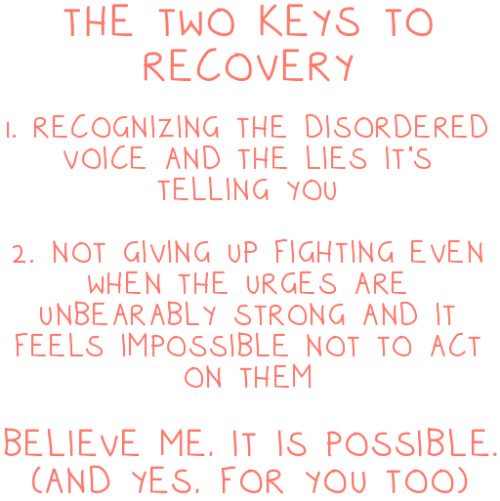 |
| Disordered Eating Recovery advice |
"Counting calories, fixation on weight, preoccupation with food or cooking, and strenuous exercise are all dietary requirements for fat people, but if you are thin you have an eating disorder." These behaviors are encouraged by society (at least in the US and UK) for people who are overweight or obese and are denounced for people who are not. My point is that dieting promotes disordered eating. Perhaps it was ignorant of me to compare fat people on diets to anorexic people; I apologize.
However, even though debilitating, all consuming, dangerous dieting is part and parcel of anorexia, I disagree that not eating is involuntary. Not eating to an anorexic is as involuntary as smoking is to a chain smoker. They both know good and damn well what they are doing is dangerous and detrimental to their health, and both participate anyway. I like the smoking analogy because not eating is still a high for an anorexic like nicotine is for a smoker. And just like smoking, the person who is suffering from this disorder needs help to overcome it.
 As for choosing to diet, this is true in part. Someone who chooses to diet (or get bariatric surgery) are those who have an incredible amount of pressure from society to change their bodies, to change who they are. It is socially expected that a fat person is "actively trying to fix " themselves and if they are not, they are berated and insulted and concern trolled and shunned and passed over until they "do something" about themselves.
As for choosing to diet, this is true in part. Someone who chooses to diet (or get bariatric surgery) are those who have an incredible amount of pressure from society to change their bodies, to change who they are. It is socially expected that a fat person is "actively trying to fix " themselves and if they are not, they are berated and insulted and concern trolled and shunned and passed over until they "do something" about themselves. So fat people go on diets that have 1,200 or 800 or 500 calorie limits or they just stop eating altogether until they black out. I personally know someone who quit eating for 5, 6, 7 days at a time and if she did eat, she would purge it. This woman would work out compulsively and force herself through the pain. She said, "once you get past the third day hunger pains, they go away and you don't notice them anymore." She was hospitalized several times for just passing out at seemingly random times to other people. She did this for her entire teenage years. This woman was 170lbs, 6'0" tall, with a BMI of 23 (on the "high side" of normal) and is my own mother. I have read this same story all over the Fatosphere as well; it is not uncommon. This is disordered eating.
Another thing; while anorexia has existed for centuries it didn't become noticeable until 1970's, which happens to be the same time that diets came on the scene. From the Medical Dictionary:
"[Anorexia nervosa's] incidence in the United States has more than doubled since 1970. The rise in the number of reported cases is thought to reflect a genuine increase in the number of persons affected by the disorder and not simply earlier or more accurate diagnosis." (emphasis mine)
I noticed a few other things on the Medical Dictionary that should be mentioned too:
"Social factors. Anorectics are more likely to come either from overprotective families or disordered families where there is a lot of conflict and inconsistency. Either way, the anorectic feels a need to be in control of something, and that something becomes body weight. The family often has high, sometimes unrealistic, and rigid expectations. Often something stressful or upsetting triggers the start of anorexic behaviors. This may be as simple as a family member as teasing about the person's weight, nagging about eating junk food, commenting on how clothes fit, or comparing the person unfavorably to someone who is thin. Life events such as moving, starting a new school, breaking up with a boyfriend, or even entering puberty and feeling awkward about one's changing body can trigger anorexic behavior. Overlaying the family situation is the unrelenting media message that thin is good and fat is bad; thin people are successful, glamorous, and happy, fat people are stupid, lazy, and failures." (emphasis mine)The diet culture we live in is recognized as a factor for anorexia. Thin at any cost, any cost. It is worth saying, however, that this disorder is thought to be caused by heredity, biological, psychological, and social factors and that the combination of these things are at play. "Research suggests that some people have a predisposition toward anorexic and that something triggers the behavior, which then becomes self-reinforcing."
Now let me move specifically to the Facebook comments. Amber makes a great point; she objects that I said dieting and eating disorders are the same:
"I think it's important to make a distinction between the two because if you say 'diets are eating disorders', it also opens up the idea that eating disorders are diets, which trivializes the seriousness of restrictive disorders. Generally speaking, your average dieter does not have the 20-30 percent mortality rate that your average anorexic does. Anorexia, sadly, is often fatal.
I'm aware that this is not intended, but if one says 'A is identical to B', the implication is that B is also identical to A, which I think is a dangerous way of thinking. I have no doubt that dieting, in certain individuals prone to disordered methods of thinking, may expand into becoming an eating disorder. Both dieting and eating disorders can be extremely dangerous, and both reflect on the disgusting narrow window of what is considered societally[sic] attractive. But I don't necessarily think saying they're the same thing is beneficial to either dieters or anorexics."
The first sentence is a "All poodles are dogs therefore all dogs are poodles" logical fallacy. Everything else proceeds from there. There is no way that saying dieting is not disordered behavior. It *is* disordered behavior. It's not *compulsive* disordered behavior with an inability to see reality in the mirror. I do think dieting is dangerous, possibly just as dangerous as an eating disorder, especially what some call "crash diets" because studies show that those fat people who never diet are much healthier than those who diet. That said, there is a difference between anorexia and dieting; for example, it's the difference between a 3 pack a day asthmatic with an oxygen tank
and someone who only smokes when they drink and they only drink 3 times
a year. Anorexics are addicted to dieting; your average dieter is not. Anorexics have body dysmorphic disorder; your average dieter does not. That's not to say that these don't occur in dieters, just that the average don't do or have these things.
I thank everyone who read my post and everyone who commented. Your opinions are valued and I appreciate them. Carry on!
No comments:
Post a Comment